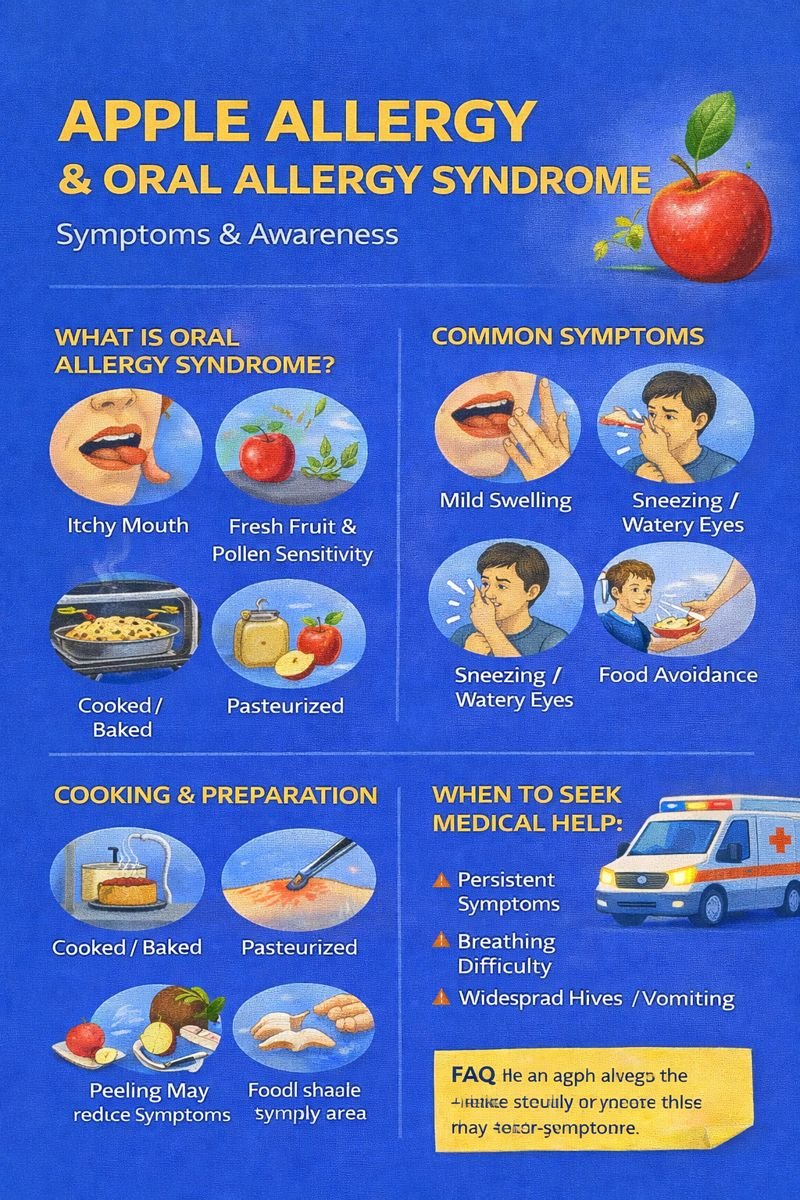Apple Allergy & Oral Allergy Syndrome: Symptoms and Awareness

Seasonal & workplace relevance (Canada)
OAS is commonly noticed during birch pollen season and may affect people who handle or prepare raw fruit at home, in food service, or in school/work cafeteria settings. Awareness helps identify mild reactions and encourages individuals to seek guidance if symptoms change or become more concerning.
Scenario story
During spring pollen season, Priya ate a fresh apple during a break at work. Within minutes, her lips and mouth felt itchy and tingly. The sensation faded after she stopped eating the apple. Later she learned that birch pollen sensitivities can cross-react with apples and certain other raw fruits.
What is oral allergy syndrome?
-
OAS typically affects the mouth, lips, tongue, and throat
-
Symptoms usually begin soon after eating raw fruit
-
Cooking or processing often reduces symptoms
-
Fruits in the Rosaceae family (e.g., apples, peaches, some nuts) may be involved in pollen-food cross-reactions
Common symptoms
Symptoms are usually localized and short-lasting:
-
Itching or tingling in the mouth or lips
-
Mild swelling around lips or gums
-
Scratchy throat sensation
-
Watery eyes or runny nose (in some cases)
-
Sneezing
Some people also notice mild gastrointestinal discomfort such as stomach upset after eating the triggering food.
Allergic reactions involving apples
While most OAS reactions are mild, some individuals may experience:
-
More noticeable swelling
-
Hives around the mouth
-
Worsening seasonal allergy symptoms
People with a history of severe food or pollen allergies may be at higher risk for more significant reactions and should discuss concerns with a healthcare professional.
Children and food aversion
Young children may avoid raw apples or similar fruits due to discomfort they cannot easily describe. This can be mistaken for picky eating when it is actually avoidance related to symptoms.
Cooking & preparation
Because heat can change allergenic proteins:
-
Cooked, baked, or pasteurized apples may cause fewer symptoms than raw apples
-
Peeling sometimes reduces symptoms, but not for everyone
These observations vary between individuals.
When to seek medical assessment
Consider consulting a healthcare professional if:
-
Symptoms are persistent or worsening
-
Breathing difficulty, widespread hives, or vomiting occur
-
Multiple foods trigger similar reactions
-
There is uncertainty about whether symptoms are allergy-related
Prevention & practical considerations
-
Be aware of pollen seasons if seasonal allergies are present
-
Note which forms of fruits (raw vs cooked) cause symptoms
-
Food service workers can practice simple avoidance or substitution when preparing meals for those who are sensitive
FAQ
Is an apple allergy the same as a food allergy?
OAS is a type of food-related reaction linked to pollen sensitivities. Many cases remain mild and localized.
Why does cooking reduce symptoms?
Heat may break down proteins that resemble birch pollen proteins. Responses vary by individual.
Does OAS mean someone will develop severe reactions?
Most cases remain mild, but individuals with concerns can discuss risk with a healthcare professional.
Are other foods linked to birch pollen?
Some tree fruits, nuts, and certain vegetables may cross-react, though patterns differ from person to person.
Can children have OAS?
Yes, though they may express it indirectly through avoidance rather than describing tingling or itching.
Educational note
This content supports public health and allergy awareness and does not replace clinical assessment or individualized advice for food allergies.
